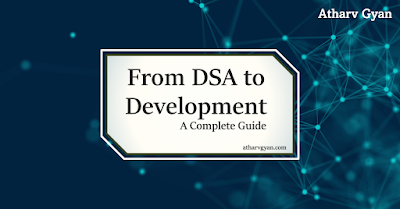DSA to Development: A Complete Guide

Transitioning from a career in Data Structures and Algorithms (DSA) to software development can be a rewarding journey. Here's a complete guide to help you make the shift: Contents 1. Assess Your Current Skillset : - Evaluate your proficiency in DSA and coding skills. - Identify the programming languages you are comfortable with. 2. Choose a Development Path : - Decide whether you want to focus on web development, mobile app development, data science, or another area of software development. - Research the skills and technologies required for your chosen path. 3. Learn Programming Languages : - If you aren't already proficient, learn languages commonly used in your chosen field. For web development, this could be JavaScript, HTML, and CSS. 4. Version Control : - Understand version control systems like Git, which are essential for collaborative software development. 5. Build Projects : ...


